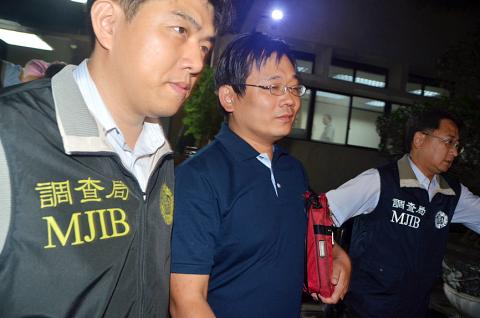Win Semiconductors Corp (穩懋半導體) yesterday said investigators suspect some of its former and current engineers of involvement in the theft of corporate secrets, some of which were sent on to Chinese rival Chengdu Gastone Technology Co (成都嘉石).
The investigation is the latest in a slew of trade-secret thefts linked to the nation’s technology companies, after employees of handset chipmaker MediaTek Inc (聯發科) pleaded guilty of stealing personnel information to be used in talent poaching last month.
Win Semi called on rivals to stop stealing trade secrets, poaching talent or employing any other unfair competition practices, the company said in a filing with the Taiwan Stock Exchange.

Photo: Cheng Shu-ting, Taipei Times
More than 50 investigators yesterday raided 12 locations, including the offices and homes of seven former and current employees of Win Semiconductors, and have seized important evidence, the Ministry of Justice Investigation Bureau said in a statement.
“Investigators found seven suspects, led by one surnamed Yang (楊), have passed information on key technologies developed by Win Semiconductors to its Chinese rival, Chengdu Gastone,” an investigator said on the telephone.
Chengdu Gastone approached former Win Semiconductors employees and its equipment suppliers via headhunting agencies to obtain trade secrets and key technology information, said the investigator, who declined to be named.
The Chinese semiconductor company offered bribes and jobs in exchange for valuable technology information, the bureau said in the statement.
Yang and other suspects were offered positions at Chengdu Gastone and they were set to leave Taiwan for China on Monday, the bureau added.
Win Semiconductors is the world’s largest foundry services provider of gallium arsenide components used in mobile phones. The Linkou (林口), Taoyuan-based firm has become a target of Chinese rivals as they aggressively expand their reach in the supply chain of the semiconductor industry, the statement said.
China plans to build new factories to produce gallium arsenide components in Beijing, Chengdu and Fuzhou, the bureau said, citing information it obtained.
Two months ago, Win Semiconductors told the Taoyuan District Court that it had found several employees had illegally duplicated and stored certain secret technology information. The company told the court at the time that it was highly concerned about possible leakage to rivals.
Win Semiconductors reported net income of NT$805 million (US$24.6 million) for last quarter, up 30 percent from a year earlier and 83 percent from the previous quarter, with earnings per share of NT$1.32. In the first three quarters, cumulative earnings per share reached NT$2.81, while revenue totaled NT$9.87 billion in the first 10 months of the year, up 20.11 percent from a year earlier.
The company yesterday said its operation would not be affected by the latest investigation.
Last month, management forecast revenue for this quarter to increase by high single digits from last quarter’s NT$2.913 billion with a stable gross margin, saying that inventory correction would gradually come to an end, and citing emerging signs of stabilizing demand from wireless, cellular and infrastructure segments.
Win Semiconductors shares plunged 3.43 percent to NT$46.5 yesterday, under-performing the TAIEX, which declined 1.77 percent.

TAKING STOCK: A Taiwanese cookware firm in Vietnam urged customers to assess inventory or place orders early so shipments can reach the US while tariffs are paused Taiwanese businesses in Vietnam are exploring alternatives after the White House imposed a 46 percent import duty on Vietnamese goods, following US President Donald Trump’s announcement of “reciprocal” tariffs on the US’ trading partners. Lo Shih-liang (羅世良), chairman of Brico Industry Co (裕茂工業), a Taiwanese company that manufactures cast iron cookware and stove components in Vietnam, said that more than 40 percent of his business was tied to the US market, describing the constant US policy shifts as an emotional roller coaster. “I work during the day and stay up all night watching the news. I’ve been following US news until 3am

UNCERTAINTY: Innolux activated a stringent supply chain management mechanism, as it did during the COVID-19 pandemic, to ensure optimal inventory levels for customers Flat-panel display makers AUO Corp (友達) and Innolux Corp (群創) yesterday said that about 12 to 20 percent of their display business is at risk of potential US tariffs and that they would relocate production or shipment destinations to mitigate the levies’ effects. US tariffs would have a direct impact of US$200 million on AUO’s revenue, company chairman Paul Peng (彭雙浪) told reporters on the sidelines of the Touch Taiwan trade show in Taipei yesterday. That would make up about 12 percent of the company’s overall revenue. To cope with the tariff uncertainty, AUO plans to allocate its production to manufacturing facilities in

Six years ago, LVMH’s billionaire CEO Bernard Arnault and US President Donald Trump cut the blue ribbon on a factory in rural Texas that would make designer handbags for Louis Vuitton, one of the world’s best-known luxury brands. However, since the high-profile opening, the factory has faced a host of problems limiting production, 11 former Louis Vuitton employees said. The site has consistently ranked among the worst-performing for Louis Vuitton globally, “significantly” underperforming other facilities, said three former Louis Vuitton workers and a senior industry source, who cited internal rankings shared with staff. The plant’s problems — which have not

COLLABORATION: Given Taiwan’s key position in global supply chains, the US firm is discussing strategies with local partners and clients to deal with global uncertainties Advanced Micro Devices Inc (AMD) yesterday said it is meeting with local ecosystem partners, including Taiwan Semiconductor Manufacturing Co (TSMC, 台積電), to discuss strategies, including long-term manufacturing, to navigate uncertainties such as US tariffs, as Taiwan occupies an important position in global supply chains. AMD chief executive officer Lisa Su (蘇姿丰) told reporters that Taiwan is an important part of the chip designer’s ecosystem and she is discussing with partners and customers in Taiwan to forge strong collaborations on different areas during this critical period. AMD has just become the first artificial-intelligence (AI) server chip customer of TSMC to utilize its advanced